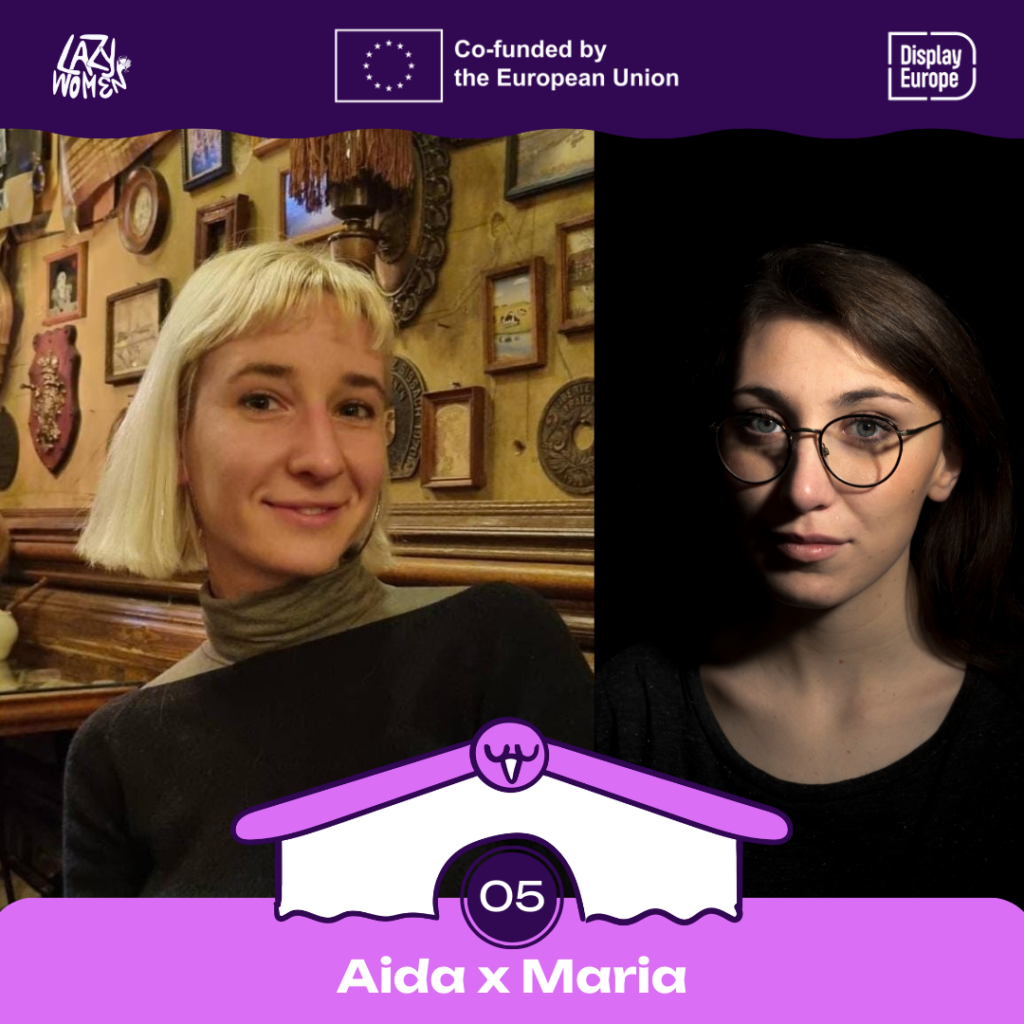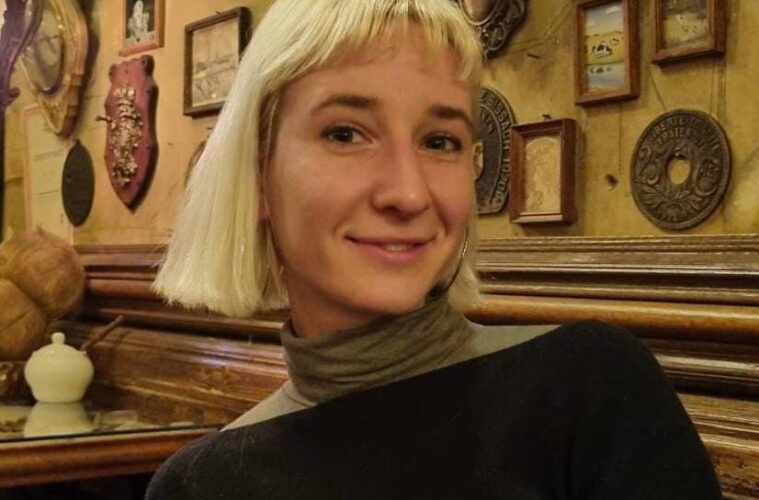Diving into the themes of identities across cultures with the Lazy Women Community
On March 10th, 2024, the fifth episode of our Making It’ In Western Europe podcast series was released, featuring Aida Kapetanovic and Maria Chiara Franceschelli. Aida came to Italy as a refugee from Bosnia when she was a child and has since perfectly integrated into Italian society. Through her research, she is now re-discovering her roots, her mother tongue, and the interrelated nature of her Yugoslav and Italian identities.
In an hour-long conversation with our Lazy Women members Lucie and Zsofi, she shared her experiences and life story with us, tackling themes of trauma, human solidarity, and connections through music. Reflecting on those experiences as an Italian with an Italian passport currently living in Russia, Maria Chiara then joined in with her local perspective and details of her own experiences and challenges as a woman living outside of her home country.
Culture Shocks
The day is April 4th, 2024, I follow a Zoom link and join Aida, Maria Chiara, Frosso, Dorina, Dinara, Zsofi, and Safae for Lazy Women’s 5th PodTalk: “Identities across countries and cultures.” What’s a PodTalk, you may wonder? It is a community discussion in which we reflect and talk about our latest podcast episode on the themes of identity, belonging, and more. From expectations to general observations, as well as life stories and the occasional patriarchy bashing, everything is to be expected.
This time, it started with the following question: What was your biggest culture shock in the country you moved to? I was very eager to discover the answers to that one, considering I still live in the country I was born in, and have nothing to compare my (very much French, although I don’t like to admit it) habits and customs to. I was painfully reminded that here, “How are you?” does not actually mean “How are you?”, but is just another greeting word to spice up your “Hello” ‘s a little. On the same topic of politeness, the structural aspect of giving orders and asking for things, varying from one country to another, was also mentioned as a culture shock by Maria Chiara, who gave the example of the differences between the Italian and the Russian languages. These cultural and linguistic differences sometimes lead to misunderstandings in social contexts and leave us wondering about the (not so) universality of politeness.
Dorina was struck by the difference in toilets abroad, which reminded me of my 2022 trip to the US, and the unpleasant discovery of the enormous side and bottom gaps in public bathrooms. Having done some research, there are some extremely valid reasons for this: they are easier to clean, prevent undesirable behaviour, and provide better airflow, but it would appear that it also shows a difference in the European and American standards for privacy. However, the PodTalk revolved more around how well equipped toilets are according to the country you are in, especially in schools: access to soap, toilet paper, etc. In fact, the 2022 Unicef study shows that 4 out of 10 schools do not have basic hygiene services, impacting 802 million children.
Can one be truly prepared for these culture shocks? Can one plan their big move in such a way that they are fully aware of what to expect when they arrive in a new country? And, as uncomfortable as these culture shocks may sometimes be, aren’t they an inherent part of moving or going abroad? On that, Maria Chiara shared that she had no big preconceptions, and that she did not move to Russia because she thought it was the most amazing place. She moved to Russia without giving it much thought and took on this opportunity to study political science without losing her Russian knowledge, acquired in a semester abroad: “I like the language, this place is weird, but it makes me want to know more”, she thought. Despite the cold climate, whether it was political, social, or environmental, her love and curiosity for Russian art and language were enough for her to make her move. “I thought that people in cold places could only produce things that are very cold and harsh”, she confided in us.

Aida and Maria Chiara
What shapes a country’s art?
What Maria Chiara said about warm pieces of art being created in cold environments really caught my ear. When I think of the relationship between a country and the art that is produced in it, no matter the dreadfulness of its economic, political, social, or environmental situation, my mind does not go to “cold and harsh” art. It does not go to the evil propaganda art that incited people to enroll in the military alongside war criminals. Instead, my mind wanders off to the pieces of art that have been made to fight and denounce the system they have been created in, even the ones as classic as Thelma and Louise (Ridley Scott, 1991), that criticises the sexist system that never believes women who say they have been assaulted.
Later in the discussion, Aida mentioned how Bosnian artists, who moved out of their home country for a better life quality, felt “bored”, and like it was “even difficult to produce political art, because things are working here somehow”. This is proof that pieces of art are definitely influenced by their country of origin, but that does not mean that the art resembles the country. Most of the time, its aim even is to change its whole system, and resonates with activists all around the world.
Activist in our home country, activist wherever we shall be?
This PodTalk quickly got to the subject of activism. Most of the attendees had left their home country, and they all shared their very different experiences with activism since they emigrated.
Dinara, now living in Hungary, said that she experienced a FOMO on the protests happening in her home country, Kazakhstan: these protests, violently repressed, led to an internet cutoff, which created a split between before and after they happened, changing the way people behave and talk about politics. Very much attached to her Kazakhstani heritage, she partakes in and organises protests in Hungary, along with the Kazakhstani community, to demand criminalisation of domestic violence and rampant femicide in Kazakhstan. On the same note, Dorina follows the news of her home country more than she does with her current country of residency, which raises a whole new issue: the accessibility of information. 72% of internet users aged 16-74 in the EU read news sites, newspapers and news magazines online (Eurostat statistics). In 2021, social media even got ahead of direct news pages as the preferred news source (28% against 23% in 2022). People now get their news from people they trust, influencers or friends, instead of TV channels, often seen as biased. This (un)accessibility to information is yet again closely linked to one’s social background, with people in rural areas, and especially women, struggling even more to find diverse and reliable news sources.
On the other hand, Maria Chiara is more invested in the politics and activism in Russia where she currently lives, than in her native Italy, saying that “[she is] not detached from politics in general, just focusing on what is going on here, rather than on trying to keep up with what is going on there”. With this activism and knowledge, she feels more legitimate to pursue her political science studies there, and work on a sound evaluation about what’s going on as an external person with EU privileges and whose native language is not Russian.
The importance of language for integration
As aforementioned with Maria Chiara’s experience, language plays a great role when it comes to integrating into a new country. The differences in terms of politeness and social codes, can alter the way you see a population, or the way a population sees you, but it gets even deeper. On language and integrating a new country, Aida gave the example of her own father, who moved from Bosnia to Italy, and who still struggles with the Italian language: “In Italy he’s a very cold man, […] not very talkative, and then when he gets back to Bosnia, he’s so funny, he has a lot of sense of humour.”. Not only does mastering a language enable you to express yourself clearly and say exactly what you want to say, but it also helps you understand its culture better.
According to this article by Lera Boroditsky, PhD, a professor of language and cognition, language shapes “even the most fundamental dimensions of human experience: space, time, causality and relationships to others.” However, it is important to keep in mind that learning or not learning the local language, mastering or not mastering its culture, is not a requirement and is nothing but an individual choice.
If this article sparked your interest, check out our previous podcast episodes on streaming platforms, and listen to the stories of other amazing women who are definitely ‘Making It’ In Western Europe!
Many thanks to Aida and Maria Chiara for sharing their experiences in the podcast and then again in the PodTalk and for shedding light on such important topics. Thank you to everyone who participated and brought their precious perspective to the conversation—this is what it’s all about.
Written by Eloïse Batanero. Find her latest articles here!

